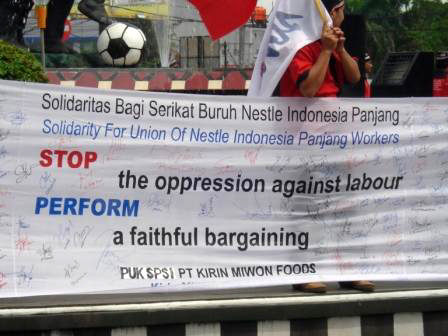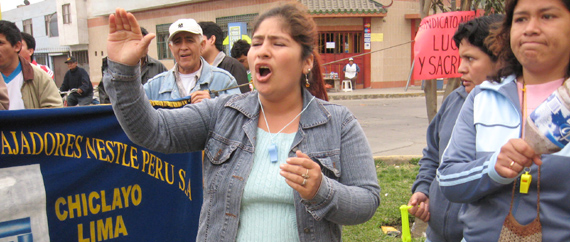Indonesia, Peru, Brazil: Nestl� Workers Worldwide Demand Decent Work, Respect for Union Rights
Posted to the IUF website 12-Nov-2008Share this article.

Union action is growing at Nestl� operations around the world as workers seek compensation for eroded purchasing power, a halt to growing casualization and respect for trade union rights, including the basic union right to collective bargaining with the world's largest food company.
On November 8, the IUF-affiliated Nestle Indonesia Workers Union - Panjang (SBNI-P) held another mass demonstration to raise public awareness of their struggle, this time in the heart of Lampung, Sumatra. The union has been struggling to negotiate a new collective agreement since late 2007. Management's response has been harassment, intimidation, forced transfers and threats against union officers. As they attempted in Perm, Russia, where international union pressure eventually forced management to back down, Nestl� is insisting that it cannot disclose (let alone negotiate!) the wage scale with the union for reasons of "commercial secrecy."

Solidarity banner from the union at PT Kirin Miwon Foods, signed by union members.
The IUF has submitted a complaint concerning Nestle Indonesia's consistently aggressive anti-union actions over the past year to the OECD National Contact Point in Nestl�'s home country of Switzerland, since these practices breach the OECD Guidelines on Multinational Enterprises.
In Peru, Nestl� management has also entered into conflict with the IUF's affiliate SUNTRANEP, which has been seeking to re-negotiate the collective agreement covering its membership at the Lima factory and the Chiclayo distribution centre since February of this year. The company has rejected the union's demand for a wage increase to cover inflation and intends to introduce new wage categories without negotiation, indicating that this has been imposed by Nestl� headquarters in Switzerland. In September, management attempted to entirely short-circuit the collective bargaining process by writing to the workers at home, urging them to accept the company's offer! Following numerous negotiating sessions, conciliation meetings and meetings under the auspices of the Ministry of Labour, a deadlock has been reached and the union is on strike.

In Brazil, IUF affiliated unions are mobilizing in support of their demand for a state-level agreement with Nestl� covering nine sites in the state of S�o Paulo. Hard hit by the rising cost of food and other necessities, the union demands include: a 40-hour workweek in all units: an end to contract and agency labour, with equal pay and conditions for all workers; and a real wage increase of 10%, with full compensation for losses due to inflation.
